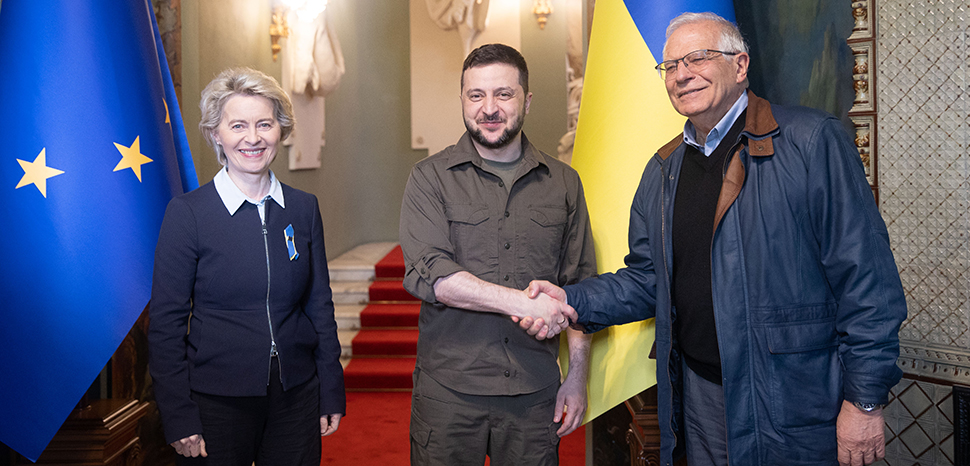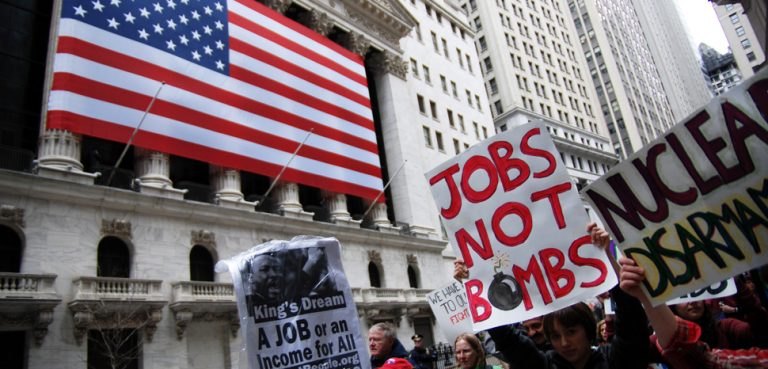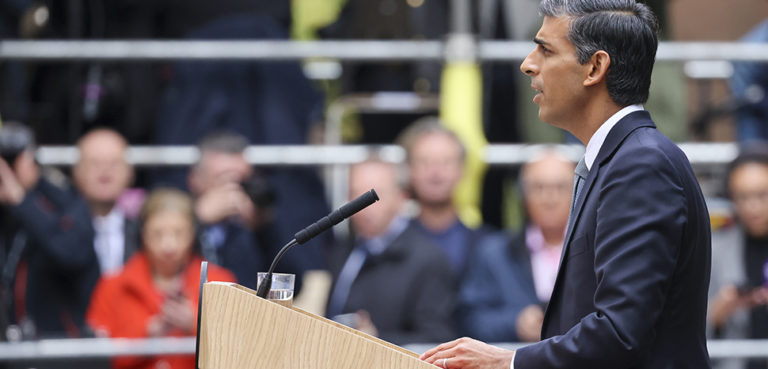Since the beginning of the Russian invasion of Ukraine there have been multiple negotiation rounds as well as proposed peace plans seeking to lay the groundwork for ending the war. While finding a lasting resolution is turning out to be elusive, if we are to take into consideration the events that have unfolded over the course of the last two years, what should almost certainly be ruled out with regard to the spectrum of desirable outcomes is the adoption of a neutral status by Ukraine.
Ukraine is not exactly a stranger when it comes to the notion of neutrality. In the aftermath of the fall of the Soviet Union, the country expressed an intention in its declaration of state sovereignty of 1 July 1990 to become a permanently neutral state that would shun participation in military blocs and show a commitment to denuclearization. This largely nonaligned status resulted in a vacillating foreign policy, which nonetheless appeared to be conducive to the pursuit of amicable relations with both the European Union (EU) and Russia, before being ultimately abandoned in December 2014 in the aftermath of Russia’s annexation of Crimea and the start of the Donbas war. In February 2019, with the overwhelming approval of the Verkhovna Rada (the Parliament of Ukraine), the Ukrainian constitution was amended, setting the country on a course toward full membership in the EU and NATO. Nonetheless, in late March 2022 Ukrainian president Volodymyr Zelenskyy was still prepared to discuss the possibility of Ukraine taking a neutral position as part of a potential peace deal with Russia to halt the invasion.
Yet there are quite a few practical and moral reasons as to why the train of neutrality should now be considered to have long left the station.
Neutrality, which remains a somewhat imprecise concept and was famously characterized in 1956 by former American Secretary of State John Foster Dulles as an “obsolete conception,” may be regarded as a state of mind or a normative self-conceptualization of the political elite and the citizens, rather than a status that a country is bound to by balance of power considerations. Arguably, the more nuanced understanding of neutrality is even more relevant in the case of consolidated democracies. Public support for Finland joining NATO (the country officially became a member on 4 April 2023) rose from approximately 33% of Finns in 2018 to close to 80% of Finnish citizens in 2022, which was clearly a significant factor when it came to the decision taken by the country’s political establishment to submit a membership request in May 2022.
Ukraine is certainly on a path towards becoming a full-fledged democracy, as a result of which any decision to either adopt neutrality or stick to an explicitly pro-Western geopolitical course needs to reflect the wishes of the general population, which are not set in stone and will not in any way be compatible with the narrow definition of Ukrainian neutrality that is likely to be put forth by the negotiators on the Russian side.
What Russian policymakers do not seem to fully realize is that the Russian troops’ actions in Ukraine have unleashed what could be described as a generational hostility directed not only toward the Russian elites but also toward the Russian people themselves, which has also had implications beyond the realm of politics. In Croatian historian Domagoj Krpan’s words, this internecine war may become the founding narrative when it comes to building a new Ukrainian national identity in the 21st century. Assuming some form of neutrality is essentially forced upon Ukraine, a de jure neutral Ukraine will continue to instinctively gravitate towards the West, will be unwilling to perceive itself as a bridge between the Occident and the “Russian world”, and will inevitably evaluate its foreign policy options through an anti-Russian prism, for instance when it comes to the manner of its voting on United Nations (UN) General Assembly resolutions.
Given that many neutral countries such as Switzerland maintain capable armed forces with a full readiness for engaging in combat, it would be quite unrealistic, even if ironclad security guarantees are provided to Ukraine by Western actors, for Ukraine to be expected to scale down its military forces to the extent that the country would remain virtually without a standing army. Thus, it is difficult to see how, especially with trust between Russia and the West being in even shorter supply than before, a solemn proclamation of Ukrainian neutrality coming from the Ukrainian government and the main Western countries supportive of Ukraine (unless it occurs at a time when the Ukrainian military has been reduced to a shadow of its current strength) would satisfy one of the conditions still insisted upon by Russia for ending the invasion, namely “demilitarization.”
In contrast to previous instances in which a neutral status was essentially imposed on a country in a manifestly weaker position than its adversary, the present state of the conflict does not necessitate the adoption of such an approach. For example, unlike in the case of Finnish neutrality during the Cold War, which was not negotiated by the Finns from something approaching a position of strength, but was a way to guarantee Finland’s national existence and security by avoiding invasion or occupation by Soviet forces, Ukraine has already had its territorial integrity blatantly violated by Russia while at the same time it has demonstrated that it can hold its own on the battlefield against the Russian forces and is unlikely to find itself, unless Western support completely dries up, in the desperate position of having to sue for peace. Thus, a settlement that includes the adoption of a neutral status will not be palatable to the majority of Ukrainian citizens, especially if it does not entail the return to Ukraine of all Russian-occupied territories. The latter prospect does not mesh that well with the current military realities on the ground and continues to be a non-negotiable issue from the perspective of the Putin administration.
From a moral standpoint, requiring Ukraine to declare neutrality is also likely to be perceived by the country’s citizens as a betrayal of them by the collective West, with the latter appearing to bow down to one of the main demands stated by Russia, especially given the enormous personal sacrifices that Ukrainian people have made for advancing the cause of European security. According to a Gallup opinion poll from October 2023, there is already a creeping sense of disillusionment among ordinary Ukrainians with regard to the level of assistance provided by the USA.
Western policymakers should also be cognizant of the reality that neutrality has often been a contrivance of statecraft associated with small states. An adoption of neutrality may be regarded as a failure on the part of the Western countries to properly acknowledge that Ukraine, which prior to 2022 was already considered by a number of scholars to be part of the ranks of the middle powers, is currently yielding vast amounts of soft power and has actually contributed (courtesy of its ability to define regional and global agendas) to elevating the status of other middle powers in international relations. Political realists such as John Mearsheimer have criticized the USA for desiring, by relying on sanctions and other punitive measures, to knock Russia out of the ranks of the great powers. However, Russia’s own culpability (since the late 2000s) with respect to fomenting justifiable concerns among many of its neighboring countries due to the former’s actions weakening the norm of state sovereignty cannot be ignored. On the other hand, symbolically relegating Ukraine (through no fault of its own) from the status of a middle power to that of a small state by requiring it to adopt neutrality would constitute a misreading of the changing dynamics within the international system and would also represent an implicit admission on the part of the West that Ukraine does not deserve to have the same agency as that of the great powers, including those of them that are not averse to engaging in gross violations of the principles of international law.
The importance of (perceived) agency is not to be underestimated because while Ukrainian neutrality could theoretically go hand in hand with a potential membership in the EU, it may become an additional stumbling block by making the country’s future accession, already viewed in a somewhat lukewarm fashion by Germany and France, an even less attractive proposition. For instance, since the launch of Permanent Structured Cooperation (PESCO) in defense at the end of 2017, the EU has become more active when it comes to military matters, but some of the neutral EU member states have not been able to make full use of the new opportunities afforded for military cooperation. Ukraine has already displayed increased interoperability with many EU countries that are also members of NATO, so being forced to opt out of common military initiatives due to a formal commitment to neutrality would be rather counterproductive with regard to both Ukrainian and EU security interests.
Even the most politically astute analysts are finding it difficult to forecast how the conflict in Ukraine will eventually end. What is virtually certain is that the (re)emergence of a neutral Ukraine should be regarded as one of the least viable scenarios, and one that will not be helpful in terms of firmly placing the country in the Western camp, where it belongs.
The views expressed in this article belong to the authors alone and do not necessarily reflect those of Geopoliticalmonitor.com.




